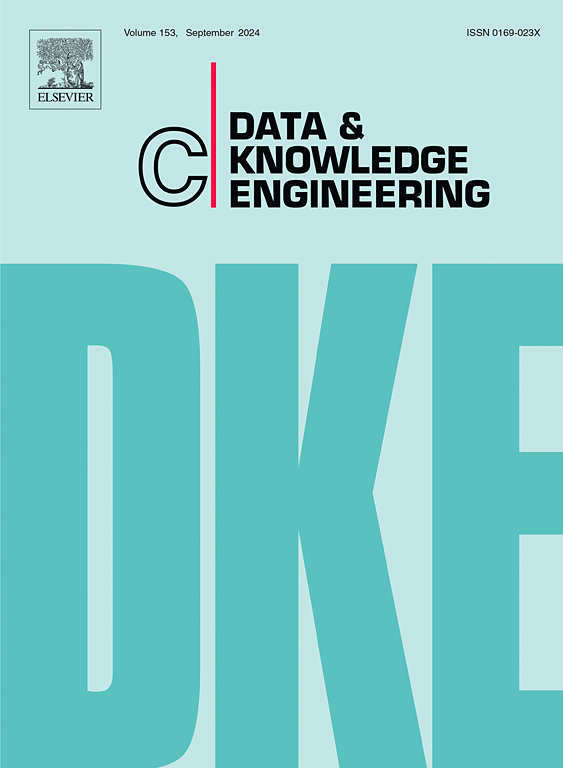Time-Aware Complex Question Answering over Temporal Knowledge Graph
IF 2.7
3区 计算机科学
Q3 COMPUTER SCIENCE, ARTIFICIAL INTELLIGENCE
引用次数: 0
Abstract
Knowledge Graph Question Answering (KGQA) is a crucial topic in Knowledge Graphs (KGs), with the objective of retrieving the corresponding facts from KGs to answer given questions. In practical applications, facts in KGs usually have time constraints, thus, question answering on Temporal Knowledge Graphs (TKGs) has attracted extensive attention. Existing Temporal Knowledge Graph Question Answering (TKGQA) methods focus on dealing with complex questions involving multiple facts, and mainly face two challenges. First, these methods only consider matching questions with facts in TKGs to identify the answer, ignoring the temporal order between different facts, which makes it challenging to solve the questions involving temporal order. Second, they usually focus on the representation of the question text while neglecting the rich semantic information within the questions, which leads to certain limitations in understanding question. To address the above challenges, this research proposes a model named Time-Aware Complex Question Answering (TA-CQA). Specifically, we extend the Temporal Knowledge Graph Embedding (TKGE) model by incorporating temporal order information into the embedding vectors, ensuring that the model can distinguish the temporal order of different facts. To enhance the semantic representation of the question, we integrate question information using attention mechanism and learnable encoder. Different from the previous TKGQA methods, we propose time relevance measurement to further enhance the accuracy of answer prediction by better capturing the correlation between question information and time information. Multiple sets of experiments on CronQuestions and TimeQuestions demonstrate our model’s superior performance across all question types. In particular, for complex questions involving multiple facts, the hit@1 values are increased by 3.2% and 3.5% respectively.
基于时间知识图的时间感知复杂问题回答
知识图谱问答(Knowledge Graph Question answer, KGQA)是知识图谱(Knowledge Graphs, KGs)中的一个重要课题,其目的是从知识图谱中检索相应的事实来回答给定的问题。在实际应用中,时间知识图中的事实通常有时间限制,因此时间知识图的问答技术引起了广泛的关注。现有的时间知识图问答(TKGQA)方法侧重于处理涉及多个事实的复杂问题,主要面临两方面的挑战。首先,这些方法只考虑TKGs中问题与事实的匹配来识别答案,忽略了不同事实之间的时间顺序,这给解决涉及时间顺序的问题带来了挑战。其次,他们通常只关注问题文本的表征,而忽略了问题中丰富的语义信息,这在理解问题上有一定的局限性。为了解决上述问题,本研究提出了一个时间感知复杂问答(TA-CQA)模型。具体来说,我们扩展了时间知识图嵌入(TKGE)模型,将时间顺序信息加入到嵌入向量中,确保模型能够区分不同事实的时间顺序。为了增强问题的语义表征,我们使用注意机制和可学习编码器来整合问题信息。与以往的TKGQA方法不同,我们提出了时间相关性度量,通过更好地捕捉问题信息与时间信息之间的相关性,进一步提高答案预测的准确性。在CronQuestions和TimeQuestions上的多组实验证明了我们的模型在所有问题类型上的优越性能。特别是,对于涉及多个事实的复杂问题,hit@1值分别提高了3.2%和3.5%。
本文章由计算机程序翻译,如有差异,请以英文原文为准。
求助全文
约1分钟内获得全文
求助全文
来源期刊

Data & Knowledge Engineering
工程技术-计算机:人工智能
CiteScore
5.00
自引率
0.00%
发文量
66
审稿时长
6 months
期刊介绍:
Data & Knowledge Engineering (DKE) stimulates the exchange of ideas and interaction between these two related fields of interest. DKE reaches a world-wide audience of researchers, designers, managers and users. The major aim of the journal is to identify, investigate and analyze the underlying principles in the design and effective use of these systems.
 求助内容:
求助内容: 应助结果提醒方式:
应助结果提醒方式:


